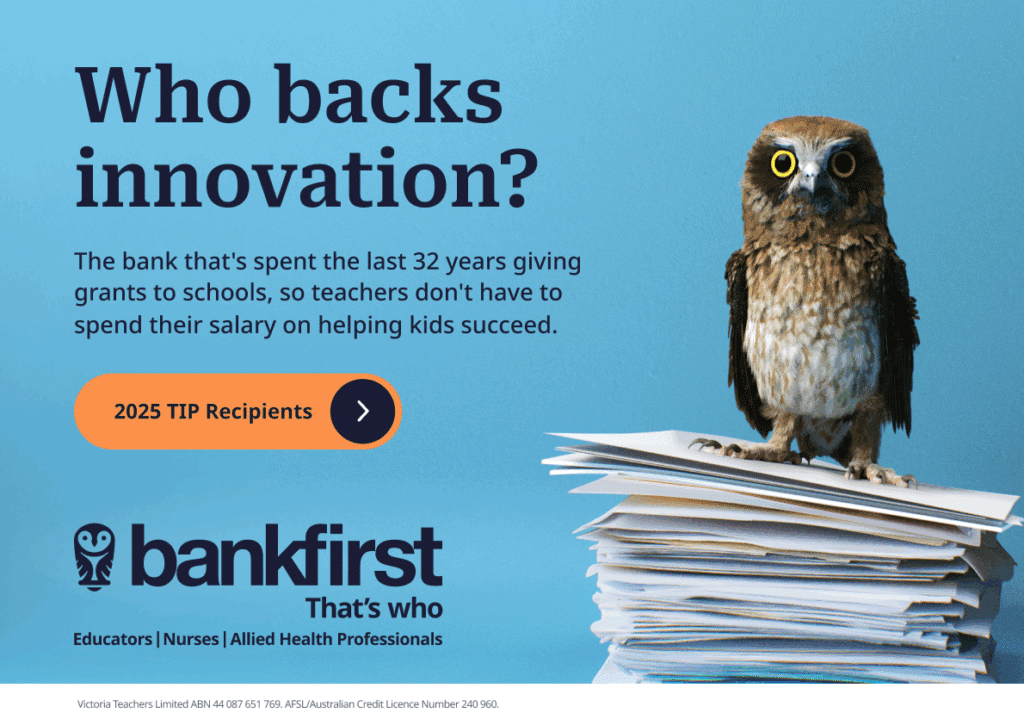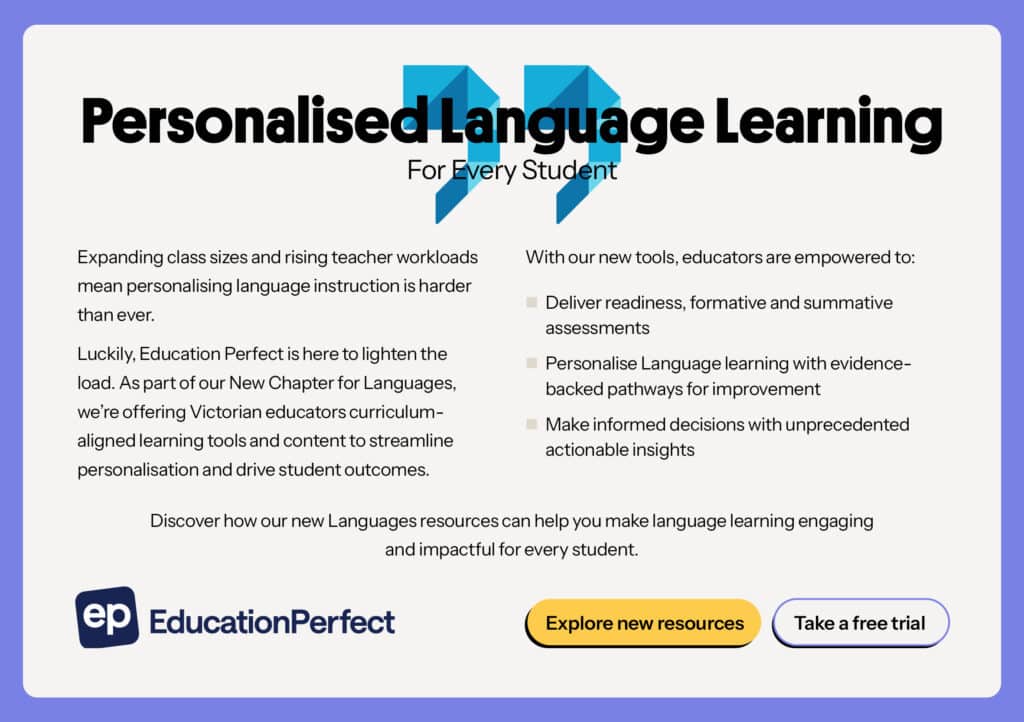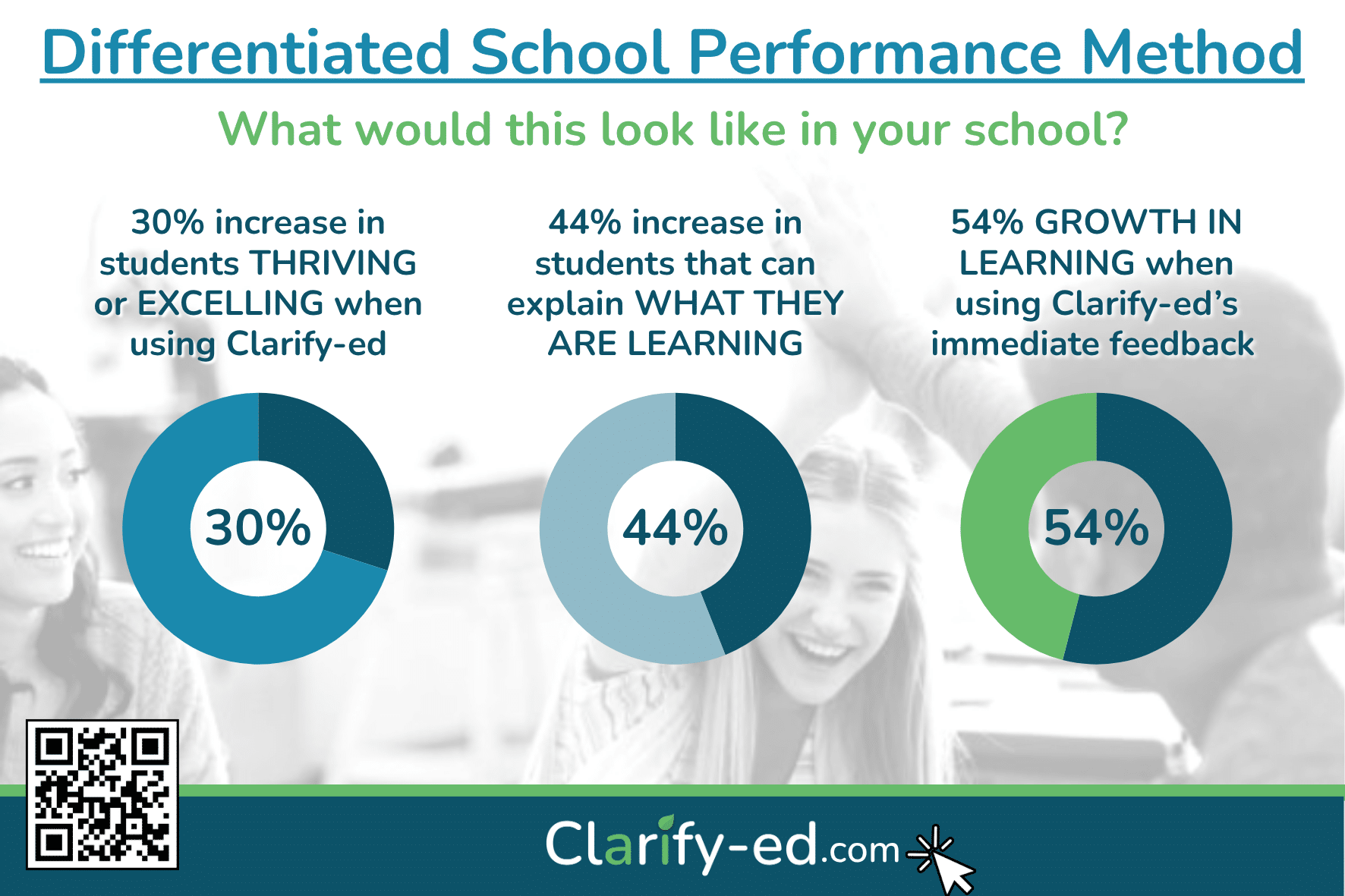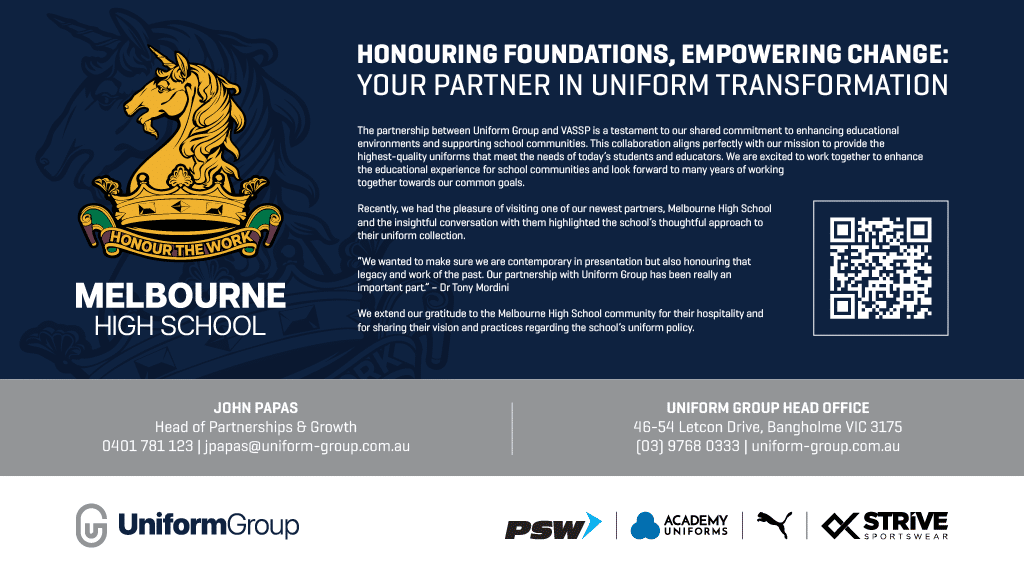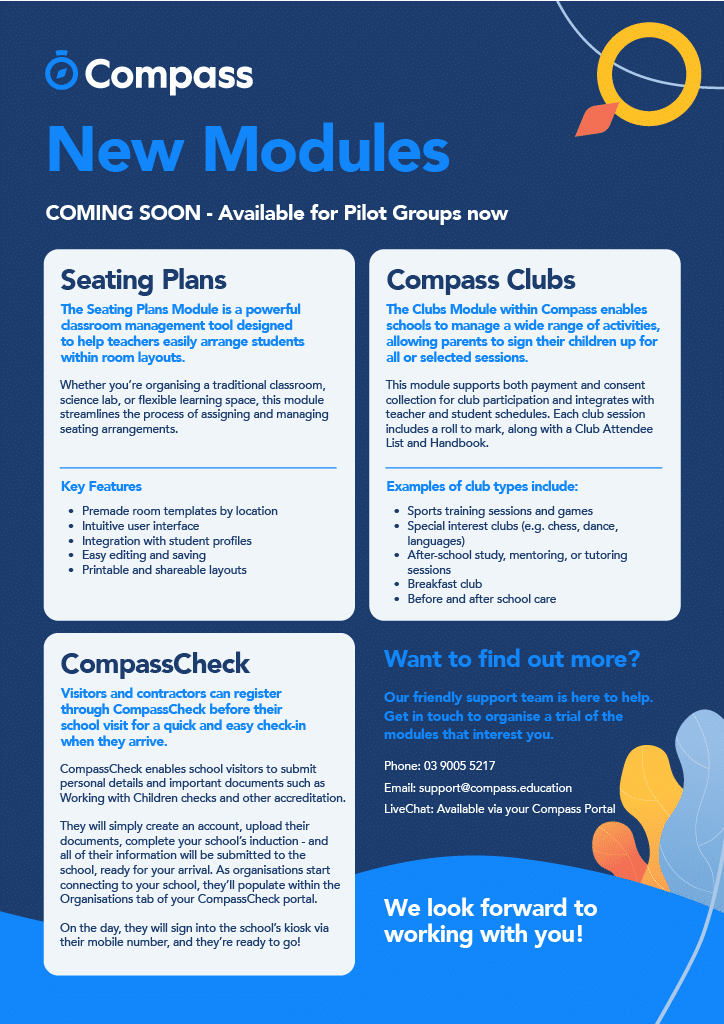INFORM Newsletter
2025, Term 3, Issue 5
President's Report

Colin Axup
VASSP President
Two weeks into Term 3 and for many the break may seem like a distant memory; albeit hopefully a good memory!? With the VASSP Conference sold out for the first time in my memory, this term promises to be a good one.
At the beginning of last week, ASPA, of which VASSP is a member, held a joint meeting with our counterparts from the Australian Government Primary Principals Association (AGPPA). This is the first time the national organisations representing (nearly) all government school principals have met to discuss common concerns. While constitutionally school education is the preserve of the states and territories, since 2010 the reach of the Commonwealth into schooling policy has grown. With the increase in discreet funding for education via the Better Fairer Schools Agreement (BFSA), the need to engage on the national stage has never been more vital. The common issues across the states and territories essentially means that we do need to both listen to each other and work together to find solutions.
The five main themes discussed were: Principal Wellbeing & Efficacy, Occupational Violence, Policy Design and Collaboration, National Education Policy Reform, Leadership Support & Development and Student Wellbeing & Safety. To a greater or lesser degree all the states and territories are working on these issues and no one jurisdiction is better than the others. Our own administration and compliance review and also the consultation paper are examples of work that other groups have been keenly reviewing.
The national architecture of education has grown and developed. Initially represented by organisations such as AITSL, ACARA, ESA and AERO, the national discourse on education is increasingly listening to the voices of the experts: principals. Through the advocacy of ASPA in particular, the National Principal Reference Group meets regularly with the Federal Minister for Education to discuss issues that affect principals across all sectors.
With almost monotonous regularity, the media will decry the declining standards of students in our schools every time another data set is released. Dr Sally Larsen from the University of New England is arguing against this narrative. Noting that system level NAPLAN results have been released this week with some positive results for Victorian students, I will, however, draw your attention to the 2022 PISA data which was discussed at the recent ASPA meeting. The general narrative is that our results are declining and that is, in a holistic sense, mostly true, albeit not significantly. What we don’t hear in the public commentary is that when you split the results into government, independent and Catholic schools, the trend tells a different story. Government school students are either improving or holding their own, which means that the other sectors are the ones that are ‘declining’. In the inevitable media frenzy following the release of NAPLAN, we will have to contend with statements along the lines of “Australia’s student outcomes remain stubbornly stagnant” and “Victorian students defy national NAPLAN tend of lacklustre results” or “punctuation a problem but we’re tops”. Amidst this media pontification we know that our school leaders will continue to focus on the individual needs of their students and leave the public commentary to the ‘experts’.
When the discussion turns to data, it raises the ongoing question of the use of data. Having measures can be a positive for schools; however, this changes when the measurements become targets. Goodhart’s Law states that “when a measure becomes a target, it ceases to be a good measure.” In recent discussions about the DSPM, the question was asked ‘why do schools gave to be categorised?’. How one answers that question provides an insight into how data is used. Regardless of the response, it is pleasing to note there will be changes to the AIP for next year, reducing the number of goals and also removing the financial reporting components and the need to get school council approval.
Finally, the role of the principal class in leading our schools has never been more important. I hope your staff celebrate you on Friday 1 August; Principals’ Day.
Need to Know
VASSP RULE CHANGE: PASSED
On 29 July, VASSP members endorsed the following amendment to the Association’s rules:
Rule 16.2: To be eligible for election to the office of President, a candidate must have served as a member of the VASSP State Committee for a minimum period of one (1) full calendar year prior to the date of nomination.
This change reinforces the importance of State Committee experience in supporting effective presidential leadership.
HONOUR A COLLEAGUE AND MEMBER
VASSP Life Membership
Becoming a VASSP Life Member is more than a badge of honour-it’s a commitment to the future of public secondary education. Life Membership is not just recognition for years of dedication, but a pledge to continue shaping our profession.
Why Life Membership matters:
- Legacy of leadership: Life Members are custodians of wisdom, offering guidance to new and experienced principals and assistant principals alike.
- Ongoing influence: VASSP Life Members are both retired and current principal class who continue to influence policy, advocacy, and best practices.
- Community connection: VASSP Life Membership ensures that those who have given so much to our schools remain part of the evolving conversation, sharing their insights and support.
In a rapidly changing educational landscape, the voice of experience is invaluable. Life Membership guarantees that this voice is not only heard but actively contributes to the future
VASSP members are invited to nominate a peer by visiting the VASSP website.
Nomination criteria and forms are available upon login.
TEACHER SHORTAGE IMPACT SURVEY - TERM 3
Survey link: Term 3, 2025 Teacher Shortage Impact Survey
*VASSP continues to encourage members to share how their school is responding to staffing shortages. This survey offers continuous insights into the impact of staff shortages in secondary schools. The data supports our advocacy, highlighting the nuances and complexity of managing the secondary school environment.
OPPORTUNITIES

The Harding Miller Education Foundation (HMEF) provides high-value scholarships to girls in public schools across Australia who demonstrate academic excellence, face financial barriers, and are highly motivated to succeed and pursue tertiary education. A short video linked here provides an overview of HMEF and the scholarship.
We are hoping to increase the number of applications received—and scholarships awarded—across Victoria this year. Here’s a look at recent VIC scholarship numbers:
- 2024: 34 recipients
- 2025: 36 recipients
We would love to see these numbers grow in 2026, and to reach more eligible students in Victoria, we really need your help. If you know any high-achieving Year 8 girls who meet the eligibility criteria, we encourage you to direct them to apply and support them during the process.

The Academy recently undertook an evaluation of the Principals in Residence initiative, to assess its effectiveness, impact, and appropriateness.
The evaluation and an insights paper, which summarises the findings are linked. The Academy would like to thank all o you who took part in the evaluation.
Read the insights summary here
For any queries about the evaluation, please contact Gerard O’Shaughnessy: gerard.oshaughnessy@education.vic.gov.au.
Expressions of interest: Academy Expert Teachers in Residence 2026
The Victorian Academy of Teaching and Leadership (the Academy) is seeking highly skilled teachers to play an important system role as Expert Teachers in Residence, supporting and facilitating Academy projects and programs, including, but not only, the Teaching Excellence Program (TEP) in 2026.
I am writing to ask you to share this opportunity with your networks, and to encourage any exceptional teachers you know to apply. These 12–month positions are open to educators working in the government, Catholic and independent sectors.
Expressions of interest close 5:00pm Tuesday 12 August. Details about the role and application process can be found on the Academy website, including upcoming information sessions in July and August.
Expert Teachers are critical to the success of the Academy’s Teaching Excellence Program, the Teaching Impact Fellowship, and the Academy alumni. Expert Teachers also lead and support professional learning in literacy, numeracy, teaching practice, and current priorities in education, while also supporting a range of leadership excellence programs.
Alongside professional learning delivery, Expert Teachers contribute to the Academy’ objectives and provide thought leadership, insights, resources and guidance for teachers and schools.
The location of these positions will be the Melbourne CBD and across the Academy’s 7 regional centres. We warmly welcome regional applicants. The Expert Teacher role is primarily based in Melbourne, however, consideration of other arrangements can be made for candidates based in regional areas. Frequent travel to the Academy’s 7 regional centres is a requirement of this role.
For any queries related to these positions, please contact Dr Catherine Devine, Principal in Residence, Teaching Excellence Division: Catherine.Devine@education.vic.gov.au

Whether it for students’ preparing for your exams, building the capacity of teachers’ new to VCE Mathematics, or looking to strengthen your maths teams practice—MAV has you covered with a suite of powerful programs and events to support success in 2025 and beyond!
VCE Revision Program for Students
Everything students need to revise with confidence!
This comprehensive online revision package features:
- 3–6 hours of engaging video content from VCAA assessors
- Common exam questions unpacked and solved
- Video demonstrations from CAS tech experts (TI-Nspire & Casio)
- A downloadable book of revision notes, past exam questions and tips
- Interactive quizzes to test understanding
- Exclusive live webinars with VCAA assessors
Pricing:
- One subject: $69
- Two subjects: $120
- All four subjects: $199
- Group discounts (20%) for 20+ student bookings available!
Teachers: Download registration form here
Learn more and sign up
MAV Annual Conference – 5 & 6 December 2025
Victoria’s premier mathematics education event!
Join hundreds of educators at the MAV Annual Conference, held at La Trobe University, Bundoora.
Dates: Thursday 5 & Friday 6 December 2025
Location: La Trobe University, Bundoora
Registrations now open
Conference synopsis released 1 August
Explore innovative practice, research, and leadership in mathematics education from Foundation to Year 12.
More details and registration
2026 VCE Conference & Regional Tours – Save the Dates!
NEW in 2026: VCE VM Numeracy and CAS-specific workshops
Melbourne VCE Conference: RMIT, Melbourne – Friday 13 February 2026
Bendigo Regional Tour: Eaglehawk Primary School – Friday 13 March 2026
Moe Regional Tour: Moe VATL – Friday 27 March 2026
NEW in 2026 – Build Me Up: VCE Supporting teachers to teach VCE Mathematics with confidence!
Support and build capacity in your teacher’s VCE Maths, Build Me Up – VCE is a hybrid professional learning program offering:
- Two full-day in-person workshops (metro & regional)
- Six interactive online sessions—“let’s do some maths together!”
- Q&A sessions with expert educators
- FREE access to Build Me Up (7–10) resources (valued at $990!)
Available in 2026 for General Mathematics and Mathematical Methods, with Specialist and Foundation Mathematics coming in 2027.
Cost:
MAV Members: $1600
Non-members: $2000
Delivered across metro and regional locations
Places are limited – register today!
Email Jen Bowden jbowden@mav.vic.edu.au to reserve a space for an unassigned teacher.
ASPA Update
ASPA Responds to 2025 NAPLAN Results: Time to Move Beyond Test Scores to Address Systemic Inequities
Australian Secondary Principals’ Association calls for a child-centred approach to education reform as national assessment data reveals achievement gaps
The Australian Secondary Principals’ Association (ASPA) today responded to the release of the 2025 NAPLAN National Results, emphasising that while modest improvements are encouraging, the persistent achievement gaps reflect broader societal inequities that cannot be addressed through education policy alone.
“Education systems mirror society’s inequities. To address gaps, we must confront structural barriers and prioritise public expenditure to support and resource schools based on equity,” said ASPA President Andy Mison in response to today’s results showing two-thirds of students at “Strong” or “Exceeding” proficiency levels, while significant disparities remain for Indigenous students, those in remote areas, and students from disadvantaged backgrounds.
Rejecting the 'Teacher-Shame' Narrative
ASPA strongly rejected any interpretation of the results that places yet more responsibility on educators, emphasising that teachers are not failing students – students and families are being failed by systems that treat equity as optional.
“For too long, NAPLAN’s annual release has been framed as a ‘crisis’ that demoralises educators and distracts from systemic solutions,” said Mison. “Teachers hear ‘code red’ rhetoric, not ‘we trust you to teach.’ Rather than blaming teachers, we must support rural and remote schools to retain educators and reduce unsustainable workloads.”
The 2025 results show that in reading, only 22.8% of students from very remote schools achieved “Strong” or “Exceeding” levels compared to 71.9% of students from major city schools, a gap that reflects systemic disadvantages no individual teacher can overcome.
Beyond Narrow Metrics
While acknowledging the 93.8% participation rate, the highest since 2017, Mison emphasised that learning extends far beyond literacy and numeracy scores.
“NAPLAN captures only a slice of student potential. It suppresses by default the value of most of the domains in our national curriculum, including the arts, sciences, humanities, technologies, languages, physical education, social and cultural competency,” he noted. “We’re abandoning creativity and joy to chase narrow benchmarks that don’t reflect the full scope of what students need to thrive.”
ASPA calls for recognition and investment in a broader conception of schooling to nurture and prepare the whole child, rather than continuing to narrow curriculum focus to the national standardised testing domains.
Systemic Change Required
The results showing 30.8% of Indigenous students in reading and 32.3% in numeracy requiring additional support, compared to fewer than 8% of non-Indigenous students, underscore the need for comprehensive reform beyond the classroom.
“Indigenous students in remote areas face systemic disadvantages that no teacher training program can fully redress without multi-agency policy reforms beyond education,” Mison stated. “Piling pressure on teachers and schools while tolerating resource inequities, housing poverty, or food insecurity won’t close gaps.”
Mr Mison emphasised the need for wraparound supports, ensuring all students have access to healthcare, nutrition, and stable housing. These are basic requirements that schools alone cannot provide.
A Call for Genuine Reform
“As Einstein said, ‘Insanity is doing the same thing over and over and expecting different results.’ For two decades, we’ve maintained NAPLAN’s narrow metrics as a driver of education policy, leading to a demoralised profession and negligible learning return,” Mison concluded. “It’s time to trust teachers, invest in communities, and redefine success beyond test scores.”
Latest blog posts from ASPA:
Gen AI in Schools: The Role of School Leaders
Improving the AERO Recipe: Forging a True Partnership for Evidence-Informed Education
If you would like to receive the ASPA Bulletin and be part of the mailing list, please register here: https://www.aspa.asn.au/contact
*VASSP values our members’ privacy and will not share member information without authorisation
Chief Operating Officer’s Report

Amy Rashid
Chief Operating Officer
State Committee 3 and Annual Dinner: Sector Leaders, System Reform and Aspiring Principals
This year’s VASSP State Committee and Annual Dinner brought together elected representatives, sector leaders and members of our Pathways to Leadership group for a day of strategic engagement. The event created space for robust, future-focused dialogue on the challenges facing school leaders and the broader system, including regulatory reform, curriculum delivery, infrastructure pressures and workforce supply. We were pleased to welcome three recently appointed CEOs to the session: Martin Fletcher from the Victorian Institute of Teaching, Andrew Smith from the Victorian Curriculum and Assessment Authority, and Joanne Wandel from the Victorian School Building Authority. Each outlined current priorities and responded to key themes raised by the profession.
Following the Term 2 State Committee meeting, where the Strategy and Secondary School Reform group presented changes to the Differentiated School Performance Method (DPSM), it was promising to see a willingness to engage with the feedback provided by principals. In this most recent meeting, potential revisions were shared, reflecting a clear intent to respond.
Once again, our State Committee, representing a wide range of school contexts, reinforced that system-level models must be flexible enough to account for the complexity and diversity of school settings.

As always, Chatham House rules applied. What can be shared reinforced the value of VASSP as a conduit between decision-makers and those leading schools every day. It was particularly powerful to have our Pathways to Leadership cohort in the room, witnessing the role of representative leadership in action. We thank all who attended for contributing to a thoughtful and energising day.
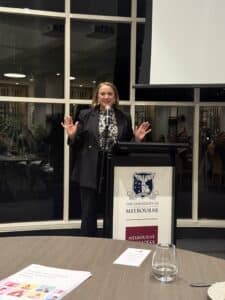
Professional Learning & Upcoming Events
- SOLD OUT – VASSP Annual Conference, Thursday 14 & Friday 15 August, Rydges Melbourne
- Applying for Principal Class Positions, Wednesday 10 September, VASSP Offices
- Understanding the Student Resource Package (SRP), Thursday 11 September (Term 3) & Wednesday 12 November (Term 4)
- VASSP AGM & Leadership Seminar, Friday 14 November, Pentridge Coburg
- Mastering the YLC Role – Wednesday 26 November, Online
For further information and to register visit VASSP Professional Learning
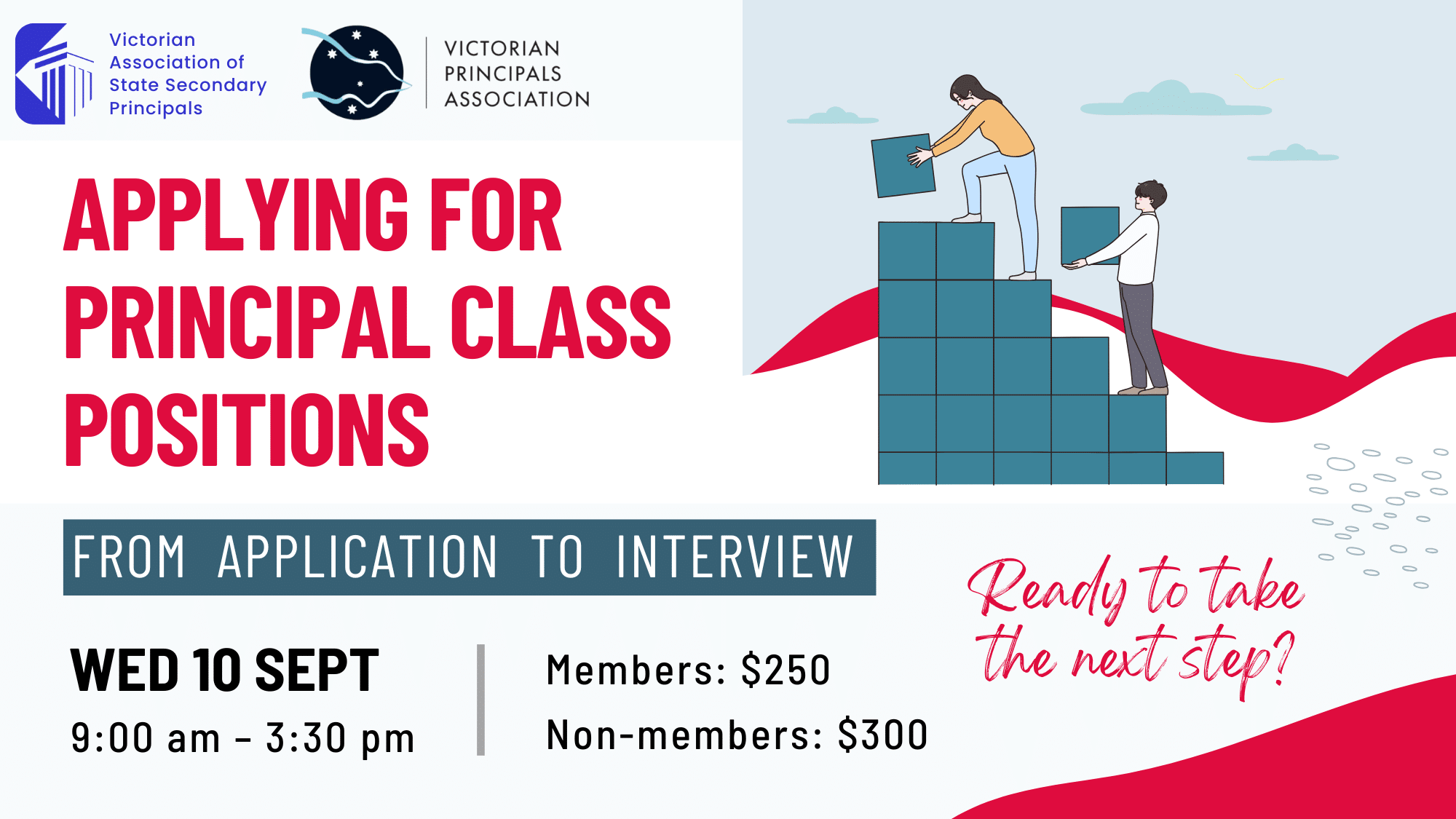
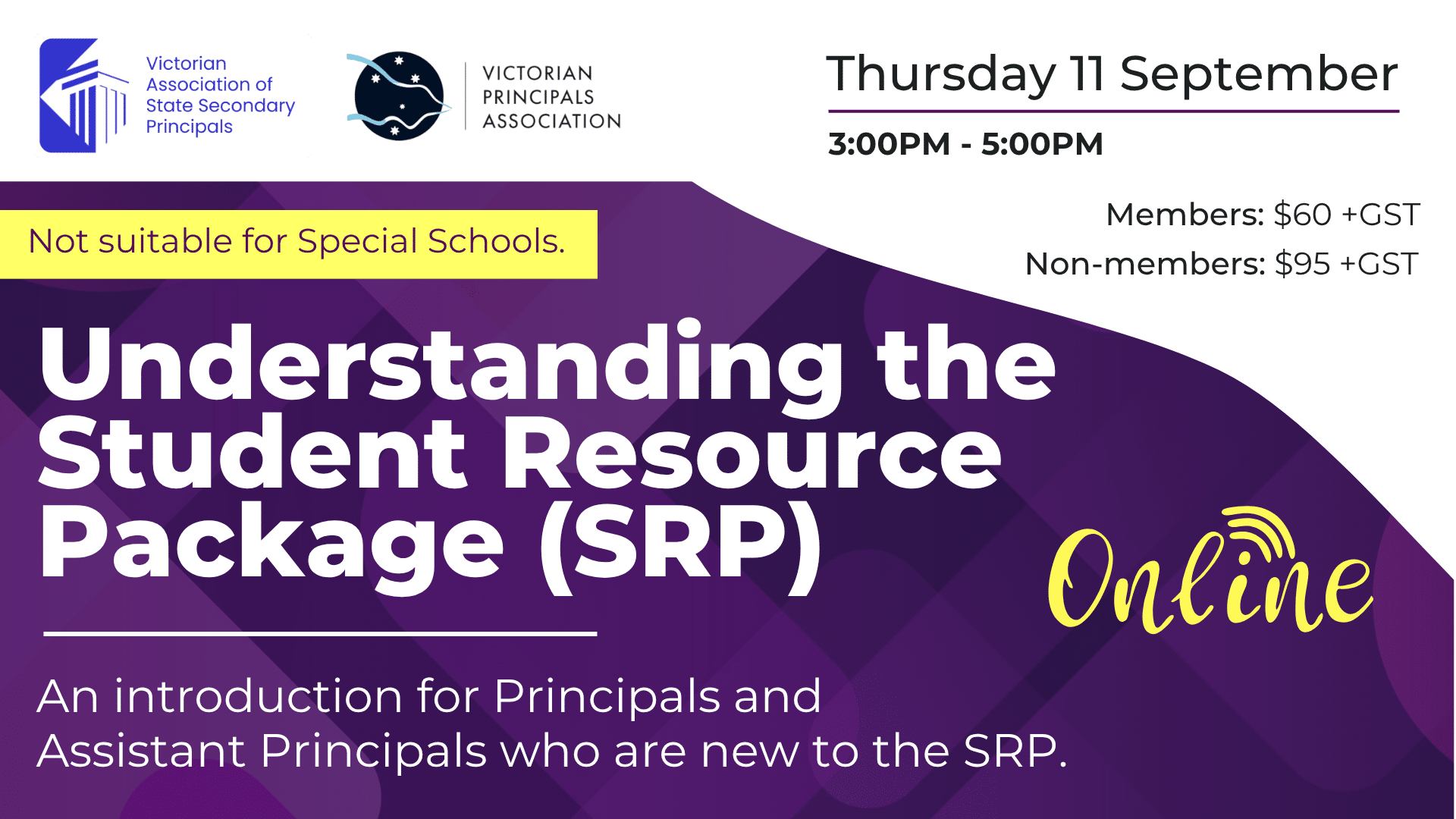
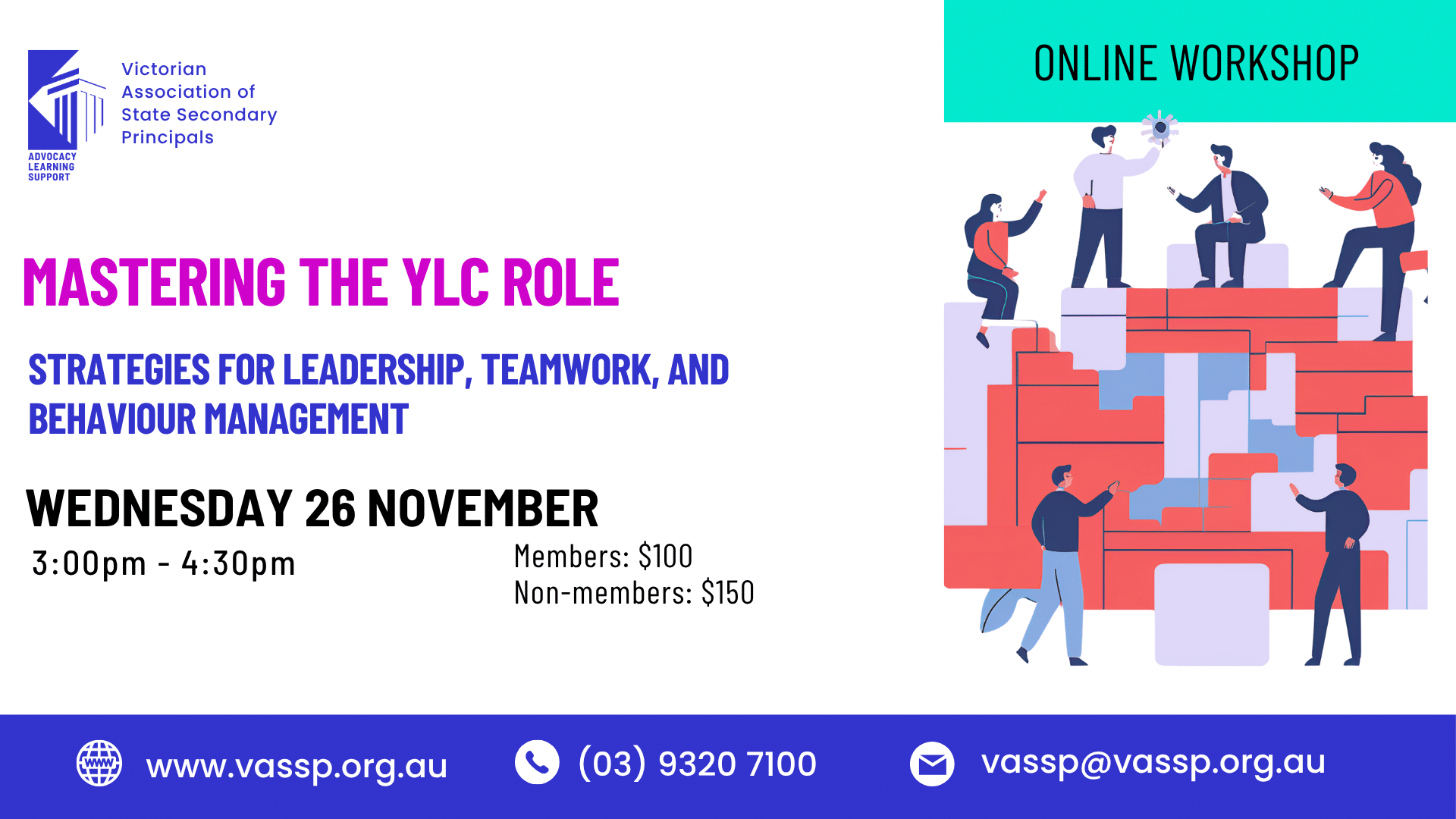
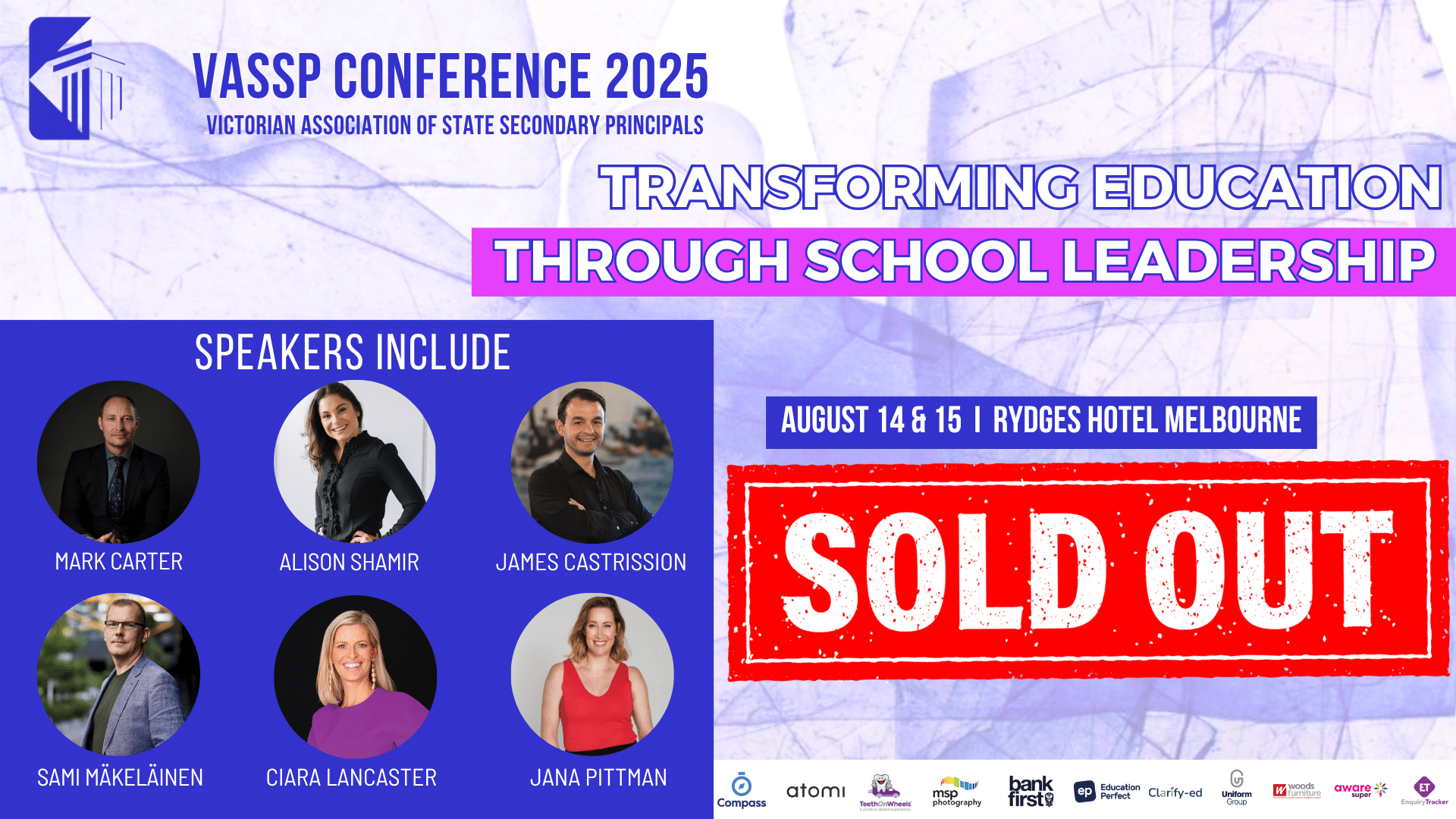
Industry Updates
Merit Protection Boards – July Newsletter
The latest issue of MPB News has now been released, helping keep you informed on latest trends and stakeholder conversations relating to workplace merit, training and grievance matters.
Department of Education: International Education and Partnerships Division
Call for expression of interest for new foreign arrangements
The Department of Education is seeking expressions of interest from schools interested in forming new sister school partnerships or varying existing partnerships with international counterparts. This is in line with Australia’s foreign policy objectives under Australia’s Foreign Relations (State and Territory Arrangements) Act 2020 (the Act).
Under the Act, schools submit a proposal to the Australian Government’s Department of Foreign Affairs and Trade, through the International Education and Partnerships Division (IEPD), before negotiating and entering into written arrangements with foreign entities.
If your school is considering a new sister school partnership or want to vary an existing arrangement, please complete the School Foreign Arrangement Form and Sister School Memorandum of Understanding and email both documents to ied.stakeholder.engagement@education.vic.gov.au by 22 August 2025.
To learn more about the process, see: process maps, or read the FAQs on our website.
VASSP Project Services
Customised, on-site project support
VASSP offers customised, on-site and independent project support, professional development and logistical support in most areas of school operations.
What services are available?
Project services include but is not limited to:
- Leadership team development workshops
- Leadership coaching – individual and team
- School Improvement Review processes
- Curriculum reviews
Click here for more information and to request a call back to discuss how VASSP Project Services can help you.
- School Policy and Workforce reviews
- Principal preparation – application writing and interview skills
- In-depth individualised support
Regional Meetings
VASSP Field Officers




Regional Group Meetings, 2025
- Term 1: Thursday 6 February, 9:00am – 11:00am
- Term 2: Thursday 1 May, 9:00am – 11:00am
- Term 3: Thursday 31 July, 9:00am – 11:00am
- Term 4: Thursday 16 October, 9:00am – 11:00am
- Term 1: Tuesday 25 February, 8:30am – 10:30am
- Term 2: Tuesday 6 May, 8:30am – 10:30am
- Term 3: Tuesday 29 July, 8:30am – 10:30am
- Term 4: Wednesday 29 October, 8:30am – 10:30am
Term 1:
- Thursday 27 February, 9:30am – 12:00pm
- Thursday 3 April, 9:30am – 12:00pm
Term 2:
- Thursday 1 May, 9:30am – 12:00pm
- Thursday 26 June, 9:30am – 12:00pm
Term 3:
- Friday 1 August, 9:30am – 12:00pm
- Thursday 18 September, 9:30am – 12:00pm
Term 4:
- Thursday 16 October, 9:30am – 12:00pm
- Thursday 11 December, 9:30am – 12:00pm
- Term 1: Friday 21 March, 10:00am – 12:30pm
- Term 2: Friday 13 June, 10:00am – 12:30pm
- Term 3: Friday 12 September, 10:00am – 12:30pm
- Term 4: Friday 21 November, 10:00am – 12:30pm
- Term 1: Friday 7 March, 9:30am – 11:30am
- Term 2: Wednesday 21 May, 9:30am – 11:30am
- Term 3: Friday 22 August, 9:30am – 11:30am
- Term 4: Friday 31 October, 9:30am – 11:30am
- Term 1: Wednesday 19 March, 10:00am – 12:00pm
- Term 2: Wednesday 25 June, 10:00am – 12:00pm
- Term 3: Wednesday 27 August, 10:00am – 12:00pm
- Term 4: Wednesday 19 November, 10:00am – 12:00pm
- Term 1: Friday 14 March, 8:30am – 10:30am
- Term 2: Friday 30 May, 8:30am – 10:30am
- Term 3: Friday 29 August, 8:30am – 10:30am
- Term 4: Friday 7 November, 8:30am – 10:30am
- Term 1: Tuesday 11 March, 10:00am – 12:00pm
- Term 2: Tuesday 20 May, 10:00am – 12:00pm
- Term 3: Tuesday 19 August, 10:00am – 12:00pm
- Term 4: Tuesday 25 November, 10:00am – 12:00pm
- Term 1: Thursday 20 March, 8:30am – 10:30am
- Term 2: Thursday 12 June, 8:30am – 10:30am
- Term 3: Thursday 11 September, 8:30am – 10:30am
- Term 4: Thursday 20 November, 8:30am – 10:30am
- Term 1: Thursday 6 March, 9:30am – 12:00pm
- Term 2: Thursday 22 May, 9:30am – 12:00pm
- Term 3: Thursday 7 August, 9:30am – 12:00pm
- Term 4: Thursday 6 November, 9:30am – 12:00pm
- Term 1: Wednesday 26 February, 8:30am – 10:30am
- Term 2: Wednesday 14 May, 8:30am – 10:30am
- Term 3: Wednesday 6 August, 8:30am – 10:30am
- Term 4: Wednesday 15 October, 8:30am – 10:30am
- Term 1: Thursday 27 March, 8:30am – 10:30am
- Term 2: Thursday 19 June, 8:30am – 10:30am
- Term 3: Thursday 4 September, 8:30am – 10:30am
- Term 4: Thursday 4 December, 8:30am – 10:30am
Friends of VASSP
Messages and updates from friends of VASSP
Ourschool Update Report

Calling for expressions of interest
If your school wants to start an alumni program next year, Term 3 this year is the time to contact Ourschool to discuss what’s involved in subscribing to our alumni service and how it works.
Please contact Michelle Buxton, Ourschool’s Operations Manager, on admin@ourschool.net.au to arrange a mutually convenient time to discuss your school’s interest in starting an alumni program for your students and teachers.
Early bird schools confirmed
Two Victorian high schools have already confirmed they will be joining our alumni program in 2026 for the first time to learn how to establish and grow an accountable, sustainable alumni program.
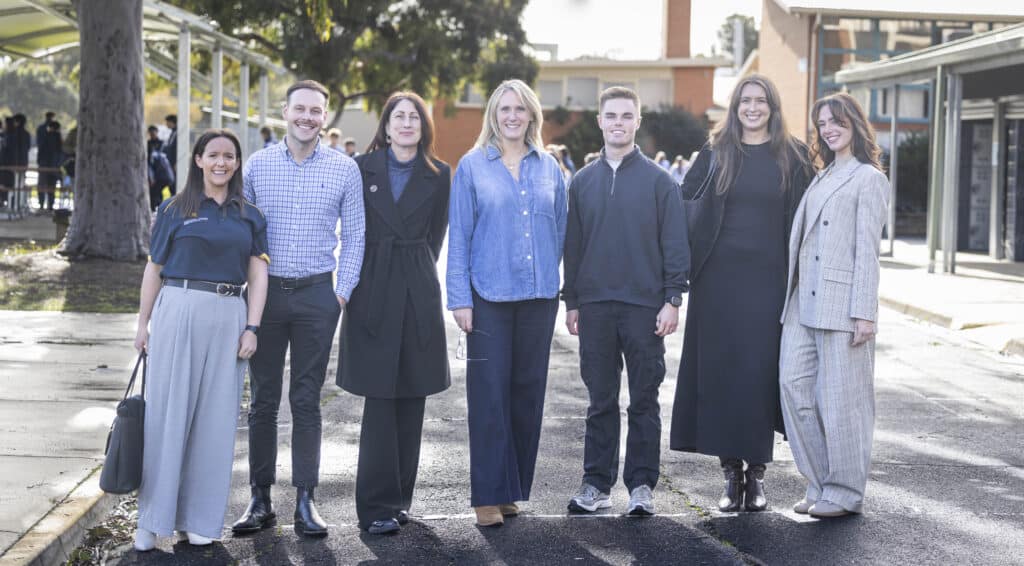
We’re delighted to announce the following schools have confirmed they will start their alumni programs with us in 2026:
- Grovedale College, Geelong
- Lyndale Secondary College, Melbourne
Deadline to confirm you school’s place in our alumni program for 2026
We have one intake of partner schools each year.
Schools planning to join our program for the first time must confirm their place by no later than Friday 24 October this year.
More updates available via Ourschool’s LinkedIn page or Ourschool’s website
Partner Messages
Partner messages

Where are you on your retirement journey? Get help on your retirement journey or check out our My retirement planner – more than just a super calculator, it provides a snapshot to see how close you are to reaching your goals.
General advice only. Consider your objectives, financial situation, or needs, which have not been accounted for in this information and read the PDS and TMD at aware.com.au/pds before acting. Issued by Aware Super Pty Ltd (ABN 11 118 202 672, AFSL 293340) trustee of Aware Super (ABN 53 226 460 365).

The Victorian Academy of Teaching and Leadership (the Academy) offers a wide range of evidence-informed professional learning designed to advance principals skills from great to exceptional. Explore the highlights below or visit the Academy website for further professional learning opportunities.
Fostering Culturally Inclusive Schools – commences 18 August
The next webinar in the Thought Leadership Series offers school leaders practical strategies to support staff and student wellbeing, strengthen culturally responsive leadership and build a school culture where everyone feels valued and safe.
Collaborative Complex Problem Solving – commences 8 September
Gain understanding of what makes a problem complex and how it can be solved through a systematic, iterative 5 stage process.
Preventing and Managing Conflict – commences 20 November
Gain the fundamental knowledge and skills needed to be competent and confident in preventing, working with, and resolving conflicts in the education community.
Consider promoting to colleagues in your school
Teaching Excellence Program (TEP) 2026 – commences 4 February 2026
Help your teachers make an impact in your school by supporting their application for the TEP. Resoundingly, 99% of last year’s TEP graduates reported it had a significant, positive impact on their professional knowledge, teaching practice and their students’ learning outcomes.
Subscribe to the Academy Connect newsletter to stay up to date with professional learning. Phone: 03 8199 2900
Provisional Appointments
VASSP would like to congratulate the following provisionally appointed leaders.

